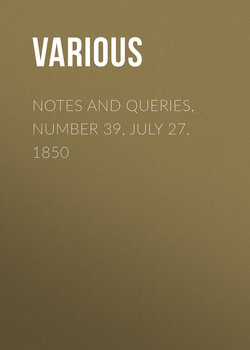Читать книгу Notes and Queries, Number 39, July 27, 1850 - Various - Страница 1
NOTES
ETYMOLOGY OF "WHITSUNTIDE" AND "MASS"
ОглавлениеPerhaps the following Note and Query on the much-disputed origin of the word Whitsunday, as used in our Liturgy, may find a place in your Journal. None of the etymologies of this word at present in vogue is at all satisfactory. They are—
I. White Sunday: and this, either—
1. From the garments of white linen, in which those who were at that season admitted to the rite of holy baptism were clothed; (as typical of the spiritual purity therein obtained:) or,—
2. From the glorious light of heaven, sent down from the father of Lights on the day of Pentecost: and "those vast diffusions of light and knowledge, which were then shed upon the Apostles, in order to the enlightening of the world." (Wheatley.) Or,—
3. From the custom of the rich bestowing on this day all the milk of their kine, then called white meat, on the poor. (Wheatley, from Gerard Langbain.)
II. Huict Sunday: from the French, huit, eight; i.e. the eighth Sunday from Easter. (L'Estrange, Alliance Div. Off.)
III. There are others who see that neither of these explanations can stand; because the ancient mode of spelling the word was not Whit-sunday, but Wit-sonday (as in Wickliff), or Wite-sonday (which is as old as Robert of Gloucester, c. A.D. 1270). Hence,—
1. Versteran's explanation:—That it is Wied Sunday, i.e. Sacred Sunday (from Saxon, wied, or wihed, a word I do not find in Bosworth's A.-S. Dict.; but so written in Brady's Clovis Calendaria, as below). But why should this day be distinguished as sacred beyond all other Sundays in the year?
2. In Clavis Calendaria, by John Brady (2 vols. 8vo. 1815), I find, vol. i. p. 378., "Other authorities contend," he does not say who those authorities are, "that the original name of this season of the year was Wittentide; or the time of choosing the wits, or wise men, to the Wittenagemote."
Now this last, though evidently an etymology inadequate to the importance of the festival, appears to me to furnish the right clue. The day of Pentecost was the day of the outpouring of the Divine Wisdom and Knowledge on the Apostles; the day on which was given to them that HOLY SPIRIT, by which was "revealed" to them "The wisdom of God … even the hidden wisdom, which GOD ordained before the world." 1 Cor. ii. 7.1 It was the day on which was fulfilled the promise made to them by CHRIST that "The Comforter, which is the HOLY GHOST, whom the Father will send in my name, he shall teach you all things, and bring all things to your remembrance, whatsoever I have said unto you." John, xiv. 26. When "He, the Spirit of Truth, came, who should guide them into all truth." John xvi. 13. And the consequence of this "unction from the Holy One" was, that they "knew all things," and "needed not that any man should teach them." 1 John, ii. 20. 27.
Whit-sonday was, therefore, the day on which the Apostles were endued by God with wisdom and knowledge: and my Query is, whether the root of the word may not be found in the Anglo-Saxon verb,—
Witan, to know, understand (whence our wit, in its old meaning of good sense, or cleverness and the expression "having one's wits about one," &c.); or else, perhaps, from—
Wisian, to instruct, show, inform; (Ger. weisen). Not being an Anglo-Saxon scholar, I am unable of myself to trace the formation of the word witson from either of these roots: and I should feel greatly obliged to any of your correspondents who might be able and willing to inform me, whether that form is deduceable from either of the above verbs; and if so, what sense it would bear in our present language. I am convinced, that wisdom day, or teaching day, would afford a very far better reason for the name now applied to Pentecost, than any of the reasons commonly given. I should observe, that I think it incorrect to say Whit-Sunday. It should be Whitsun (Witesone) Day. If it is Whit Sunday, why do we say Easter Day, and not Easter Sunday? Why do we say Whitsun-Tide? Why does our Prayer Book say Monday and Tuesday in Whitsun-week (just as before, Monday and Tuesday in Easter-week)? And why do the lower classes, whose "vulgarisms" are, in nine cases out of ten, more correct than our refinements, still talk about Whitsun Monday and Whitsun Tuesday, where the more polite say, Whit Monday and Tuesday?
Query II. As I am upon etymologies, let me ask, may not the word Mass, used for the Lord's Supper—which Baronius derives from the Hebrew missach, an oblation, and which is commonly derived from the "missa missorum"—be nothing more nor less than mess (mes, old French), the meal, the repast, the supper? We have it still lingering in the phrase, "an officers' mess;" i.e. a meal taken in common at the same table; and so, "to mess together," "messmate," and so on. Compare the Moeso-Gothic mats, food: and maz, which Bosworth says (A.-S. Dic. sub voc. Mete) is used for bread, food, in Otfrid's poetical paraphrase of the Gospels, in Alemannic or High German, published by Graff, Konigsberg, 1831.
H.T.G.
Clapton.
1
The places in the New Testament, where Divine Wisdom and Knowledge are referred to the outpouring of God's Spirit, are numberless. Cf. Acts, vi. 3., 1 Cor. xii. 8., Eph. i. 8, 9., Col. i. 9., &c. &c.
